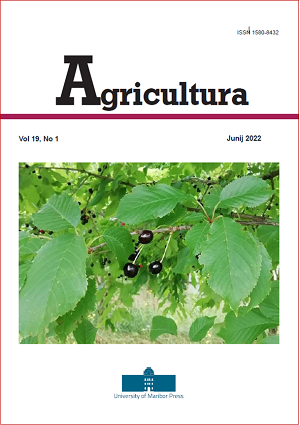Intra and between population genetic relationships among wild cherries [Prunus avium (L.) L.] based on molecular markers
DOI:
https://doi.org/10.18690/agricultura.19.1.25-32.2022Keywords:
wild cherry, Prunus avium (L.) L., population, SSR molecular markers, genetic relatednessAbstract
Wild cherries [Prunus avium (L.) L.] are considered typical trees of the Slovenian landscape and often form vigorous natural populations. The determination of genetic relationships among cultivated and wild cherry tree genotypes is important for scientific and economic reasons. Both old trees and young plants were included in our genetic analysis. Sampling took
place at two different locations near Maribor, NE Slovenia. The aim of the study was to determine the genetic relationships and variability among plants belonging to the studied populations. We focused on young trees and seedlings growing around old trees, which could be their hypothetical parents. We also analysed genetic uniformity within populations and
identified genetically distant plants that had likely migrated as seeds from other populations. Three microsatellite loci were taken into account, 38 genotypes were examined, and 19 polymorphic alleles were detected, corresponding to an average of 6.3 per locus. Genetic distances between the studied genotypes were calculated using the Jaccard’s coefficient
and a dendrogram was constructed. Genetic structure was analysed using both Principal Coordinate Analysis (PCoA) and Bayesian model-based analysis. Our study showed that there were differences between the two populations, however, there was some “communication” between them. We observed genetic relatedness as well as a relatively high level of uniformity
within each of the wild cherry populations.
Downloads
Downloads
Published
Issue
Section
License
Copyright (c) 2022 Tina Ternjak, Metka Šiško

This work is licensed under a Creative Commons Attribution-NonCommercial-NoDerivatives 4.0 International License.
